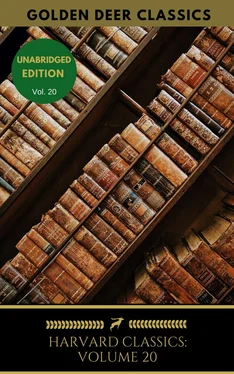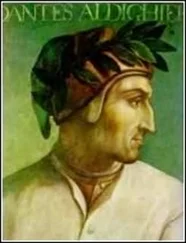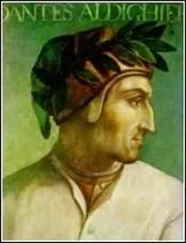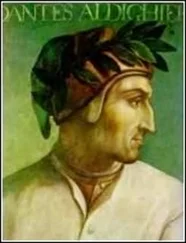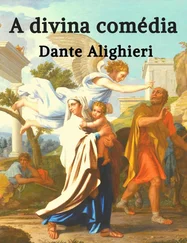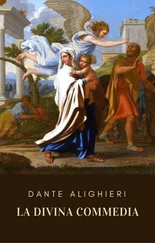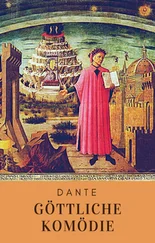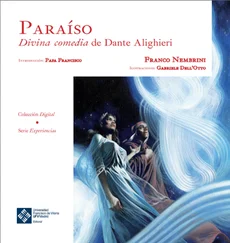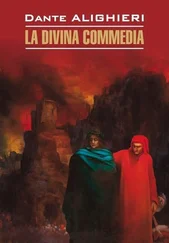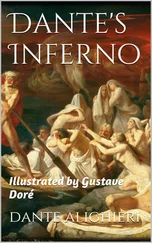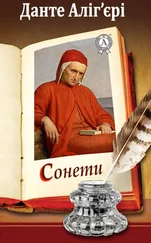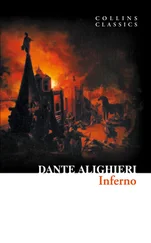Array Dante Alighieri - Harvard Classics Volume 20
Здесь есть возможность читать онлайн «Array Dante Alighieri - Harvard Classics Volume 20» — ознакомительный отрывок электронной книги совершенно бесплатно, а после прочтения отрывка купить полную версию. В некоторых случаях можно слушать аудио, скачать через торрент в формате fb2 и присутствует краткое содержание. Жанр: unrecognised, на английском языке. Описание произведения, (предисловие) а так же отзывы посетителей доступны на портале библиотеки ЛибКат.
- Название:Harvard Classics Volume 20
- Автор:
- Жанр:
- Год:неизвестен
- ISBN:нет данных
- Рейтинг книги:5 / 5. Голосов: 1
-
Избранное:Добавить в избранное
- Отзывы:
-
Ваша оценка:
- 100
- 1
- 2
- 3
- 4
- 5
Harvard Classics Volume 20: краткое содержание, описание и аннотация
Предлагаем к чтению аннотацию, описание, краткое содержание или предисловие (зависит от того, что написал сам автор книги «Harvard Classics Volume 20»). Если вы не нашли необходимую информацию о книге — напишите в комментариях, мы постараемся отыскать её.
1. The Divine Comedy, by Dante Alighieri
Also available:
The Complete Harvard Classics Collection (51 Volumes + The Harvard Classic Shelf Of Fiction)
50 Masterpieces You Have To Read Before You Die (Golden Deer Classics)
Harvard Classics Volume 20 — читать онлайн ознакомительный отрывок
Ниже представлен текст книги, разбитый по страницам. Система сохранения места последней прочитанной страницы, позволяет с удобством читать онлайн бесплатно книгу «Harvard Classics Volume 20», без необходимости каждый раз заново искать на чём Вы остановились. Поставьте закладку, и сможете в любой момент перейти на страницу, на которой закончили чтение.
Интервал:
Закладка:
The Harvard Classics
Volume 20
———
The Divine Comedyof
Dante Alighieri
Hell, Purgatory, Paradise
Translated by Henry F. Cary
Contents
Introductory Note
Hell [Inferno]
Purgatory [Purgatorio]
Paradise [Paradiso]
Glossary
Introductory Note
Much of the life of Dante Alighieri is obscure, and the known facts are surrounded by a haze of legend and conjecture. He was born in Florence in 1265, of a family noble but not wealthy. His early education is a matter of inference, but we know that he learned the art of writing verse from the poets of France and Provence, and that after he reached manhood he devoted much time to study and became profoundly learned. As a young man he saw military service and shared in the recreations of his contemporaries; and he married some time before he was thirty-two. In Dante’s day politics in Florence were exciting and dangerous; and after a few years of participation in public affairs he was condemned to death by his political enemies in 1302. He saved himself by exile, and never returned to his native town. The rest of his life was mainly spent wandering about the north of Italy, in Verona, Bologna, Pisa, Lucca, and finally Ravenna, where he died in 1321. During the years of his exile he found generous patrons in men like the heads of the Scala family in Verona and Guido Novello da Polenta in Ravenna; and at Bologna and elsewhere he was welcomed as a teacher.
In the early part of the century in which Dante was born, the literary language of Tuscany was still Latin, and not the least of his services to his country was his influence in finally establishing the dignity of Italian as a medium for great literature. He himself used Latin in at least three works: his lecture “De Aqua et Terra”; his “De Monarchâ,” in which he expounded his Political theory of the relation of the Empire and the Papacy; and his unfinished “De Vulgari Eloquentia,” containing his defense of the use of Italian. More important, however, were his two great works in the vernacular, the “Vita Nuova,” a series of poems with prose commentary, on his love for Beatrice, and the “Divina Commedia.”
The Beatrice, real or ideal, who plays so important a part in the poetry of Dante, is stated by Boccaccio to have been the daughter of Folco Portinari, a rich Florentine, and wife of the banker Simone dei Bardi. With this actual person Dante’s acquaintance seems to have been of the slightest; but, after the fashion of the chivalric lovers of the day, he took her as the object of his ideal devotion. She became for him, especially after her death in 1290, the center of a mystical devotion of extraordinary intensity, and appears in his masterpiece as the personification of heavenly enlightenment.
The “Divine Comedy” was entitled by Dante himself merely “Commedia,” meaning a poetic composition in a style intermediate between the sustained nobility of tragedy, and the popular tone of elegy.” The word had no dramatic implication at that time, though it did involve a happy ending. The poem is the narrative of a journey down through Hell, up the mountain of Purgatory, and through the revolving heavens into the presence of God. In this aspect it belongs to the two familiar medieval literary types of the Journey and the Vision. It is also an allegory, representing under the symbolism of the stages and experiences of the journey, the history of a human soul, painfully struggling from sin through purification to the Beatific Vision. Other schemes of interpretation have been worked out and were probably intended, for Dante granted the medieval demand for a threefold and even fourfold signification in this type of writing.
But the “Divine Comedy” belongs to still other literary forms than those mentioned. Professor Grandgent has pointed out that it is also an encyclopedia, a poem in praise of Woman, and an autobiography. It contains much of what Dante knew of theology and philosophy, of astronomy and cosmography, and fragments of a number of other branches of learning, so that its encyclopedia character is obvious. In making it a monument to Beatrice, he surpassed infinitely all the poetry devoted to the praise of women in an age when the deification of women was the commonplace of poetry. And finally he made it an autobiography—not a narrative of the external events of his life, but of the agony of his soul.
Thus, in an altogether unique way, Dante summarizes the literature, the philosophy, the science, and the religion of the Middle Ages. Through the intensity of his capacity for experience, the splendor of his power of expression, and the depth of his spiritual and philosophic insight, he at once sums up and transcends a whole era of human history.
Hell [Inferno]
Contents
Canto I
The Dark Wood and the Hill. Dante Meets Virgil. The salvation of Italy. Virgil will be his guide through Hell.
Canto II
Dante’s doubts as to his fitness for the journey. Virgil explains his mission: Beatrice. Virgil strengthens Dante’s will.
Canto III
The Gate of Hell. The spiritually neutral. Their punishment. Charon, the ferryman of the Acheron. The souls by the shore of Acheron.
Canto IV
The First Circle: Limbo: The Heathens. The Great Poets. The Heroes and Heroines. The Philosophers and other great spirits.
Canto V
The Second Circle: Minos: The Carnal Sinners. Virgil names the sinners. Paolo and Francesca.
Canto VI
The Third Circle: Cerbus: The Glutonous. Ciacco, the glutton. Ciacco’s prophesy concerning Florence. Virgil speaks of The Day of Judgement.
Canto VII
The Fourth Circle: Plutus: The Avaricious. The avaricious and prodigal churchmen. Virgil speaks about Fortune. The Styx: They view the Fifth Circle.
Canto VIII
They meet Filippo Argenti. They approach the city of Dis. The fallen angels obstruct them.
Canto IX
Dante asks about precedents. The Furies (Conscience) and Medusa (Obduracy). The Messenger from Heaven. The Sixth Circle: Dis: The Heretics.
Canto X
Epicuris and his followers. Farinata delgi Uberti. Cavalcante Cavalcanti. Farinata prophesies Dante’s long exile. The prophetic vision of the damned.
Canto XI
The structure of Hell: The Lower Circles. The structure of Hell: The Upper Circles. Virgil explains usury.
Canto XII
Above the Seventh Circle: The Minotaur. The descent to the Seventh Circle. The First Ring: The Centaurs: The Violent. The Tyrants, Murderers and Warriors.
Canto XIII
The Second Ring: The Harpies: The Suicides. The Wood of Suicides: Pier delle Vigne. The fate of The Suicides. Lano Maconi and Jacomo da Sant’ Andrea. The unnamed Florentine.
Canto XIV
The Third Ring: The Violent against God. Capaneus. The Old Man of Crete. The Rivers Phlegethon and Lethe.
Canto XV
The Violent against Nature: Brunetto Latini. Brunetto’s prophesy. Dante accepts his fate.
Canto XVI
Rusticucci, Guido Guerra, Aldobrandi. The condition of Florence. The monster Geryon.
Canto XVII
The poets approach Geryon. The Ursurers. The poets descend on Geryon’s back.
Canto XVIII
The Eighth Circle: Malebolge: Simple Fraud. The First Chasm: The Pimps and Seducers. The Panders: Venedico de’ Caccianemico. The Seducers: Jason. The Second Chasm: The Flatterers.
Canto XIX
The Third Chasm: The Sellers of Sacred Offices. Pope Nicholas III. Dante speaks agains Simony.
Canto XX
The Fourth Chasm: The Seers and Seducers. The Seers. Manto and the founding of Mantua. The Soothsayers and Astrologers.
Canto XXI
The Fifth Chasm: The Sellers of Public Offices. The Barrators. Virgil challenges the Demons’ threats. The Demons escort the Poets.
Читать дальшеИнтервал:
Закладка:
Похожие книги на «Harvard Classics Volume 20»
Представляем Вашему вниманию похожие книги на «Harvard Classics Volume 20» списком для выбора. Мы отобрали схожую по названию и смыслу литературу в надежде предоставить читателям больше вариантов отыскать новые, интересные, ещё непрочитанные произведения.
Обсуждение, отзывы о книге «Harvard Classics Volume 20» и просто собственные мнения читателей. Оставьте ваши комментарии, напишите, что Вы думаете о произведении, его смысле или главных героях. Укажите что конкретно понравилось, а что нет, и почему Вы так считаете.
